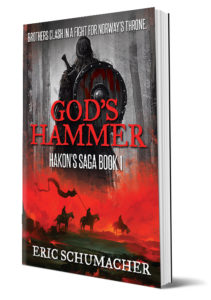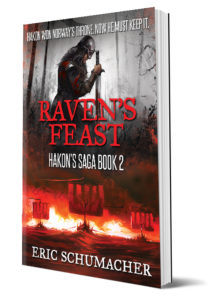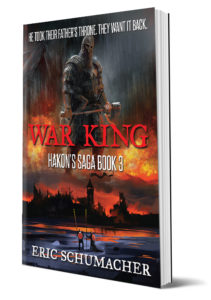08 May Author Interview Eric Schumacher

Eric Schumacher, Author, Hakon’s Saga
Introduction
It is my pleasure to introduce Eric Schumacher, author of the Hakon’s Saga. I became acquainted with Eric’s work when I voluntarily reviewed War King, Hakon’s Saga Book 3 for the Historical Novel Society.What makes Eric’s tale rise above others in this genre is his skill in vividly capturing the Viking culture, engaging the reader with the characterization of King Hakon Haroldsson, and showing the battle scenes and tactics with clarity.
Below is Eric Schumacher’s biography, author interview, and contact information. Click on the book covers below for a direct link to Amazon. Also check out his website and learn more about him as an author and his passion for Viking lore.
Biography
Eric Schumacher (1968 – ) is an American historical novelist who currently resides in Santa Barbara, California, with his wife and two children. He was born and raised in Los Angeles and attended college at the University of San Diego.
At a very early age, Schumacher discovered his love for writing and medieval European history, as well as authors like J.R.R. Tolkien and C.S. Lewis. Those discoveries continue to fuel his imagination and influence the stories he tells. His first novel, God’s Hammer, was published in 2005. His latest, War King, released in October of 2018.
For more information, visit his website: www.ericschumacher.net
Author Interview
Would you provide an overview of the books you’ve published about the Vikings in the Hakon’s Saga?
All of the books tell the story of Hakon Haraldsson, who is also known in the Norse sagas as Hakon the Good. He is the youngest son and bastard child of one of Viking Age Norway’s greatest kings, Harald Fairhair. Hakon eventually wins the throne of Norway for himself and rules the kingdom for decades. I have taken what little we know about this fascinating figure and woven it into what I hope is a rousing story of warfare, religious strife, and tested friendships.
What inspired you to write about the legendary King Hakon Haraldsson in the series?
Actually, Hakon is far from legendary in modern times, and is often overshadowed by many of his contemporaries, such as Gorm the Old, Harald Fairhair, and Erik Bloodaxe. Yet his deeds are no less heroic than those others. He is, in many ways, an unsung hero, which is part of my fascination with him.
While we don’t know all of the facts of Hakon’s life, we do know that even if marginally true, Hakon’s story is not only incredible, but it takes many of the norms of Viking literature and turns them on their head. In many ways, Hakon is the anti-Viking. Rather than the Beowulf-like champion we think of when we think of a challenger to the throne of Norway, Hakon is young, inexperienced and reliant on his counselors, at least at first. He’s also a Christian in a “heathen” land. I wanted to understand how he could have risen to the High Seat of the North with so many cards stacked against him, which is why I chose to write about him in this trilogy.
One of the most interesting aspects in Book 3: War King is Hakon Haraldsson is a Christian, but he leads Viking warriors who still hold pagan beliefs? Is there historical evidence that Hakon was a Christian and how did religious differences impact the history of the Vikings?
The specifics of Hakon’s story are clouded by time and a lack of contemporary written sources. We know only from the sagas that Hakon was raised as a Christian in the Wessex court of Athelstan, and that when he returned to Norway, he continued to practice Christianity and shun Norse religious practices, such as sacrifices. We also know from the sagas that he invited Christian clergy to erect churches and preach in his realm, though many of the churches were burned and many of the clergy murdered. Hakon’s staunch beliefs led to strife with the men who helped him win the throne, most notably Sigurd, the earl (or jarl) of Lade. We have no reason to believe that these things were untrue, since similar missions and conversions were happening elsewhere in the Scandinavian realms in roughly the same time period. What is unclear is whether Hakon converted back to the Norse religion later in life or whether he died a Christian.
The second part of your question is difficult to answer. Some say that the Viking’s initial attack on Lindisfarne was religiously motivated, and that this is what began the Viking Age. Which would mean that the Viking Age might never have occurred if we hadn’t seen the clash of two religions. I have not seen any hard evidence to support that theory. There is stronger evidence, however, to suggest that the spread of a new religion into Scandinavia caused strife. Hakon’s religious convictions led to turmoil with his jarls, and, if the sources are accurate, almost led to warfare. In Denmark, Harald Bluetooth’s conversion helped broker peace between his realm and the Christian Saxons to his south. Had he not converted, we might have seen a more protracted war between the Danes and Saxons, and possibly a different border emerge. I could point to other instances, too, but that might get too lengthy for this answer. I would put forth, though, that the spread of Christianity and eventual conversion of the Scandinavian people did not bring about peace during the Viking Age. Converted Scandinavian kings still went a-viking or attacked other kingdoms, just as Christians fought Christians in other parts of Europe. It was a violent time.
How much research was involved in writing your books? How did you go ABOUT researching the history, myths, language, and culture of the Vikings in the 10th Century?
The short answer is, a lot! With my first book, God’s Hammer, I spent five years researching. I read older works, such as the sagas, the Poetic Edda, Gesta Danorum, and Beowulf, but also many contemporary books about the Vikings. These were invaluable resources for piecing together things like possible events, chronologies, agricultural methods, living conditions, etc. Where many of them fell short, though, was in capturing the mindset of men and women who lived at that time because we simply don’t know. What did Scandinavians know about the events in others lands? What did they truly feel about other religions and people? Those are the subjects I continue to research in order to get into the minds and thoughts of my characters.
Is there any sub-character in the Hakon’s Saga series who is your favorite? Explain why.
I love several, but two are my favorite to write, both of them mentors in their own unique way to Hakon. Sigurd, the jarl of Lade, is larger than life, loud, a tad unruly and uncouth, yet shrewd, capable, and not afraid to go against his king if he thinks he can profit from it. On the opposite end of the spectrum is Egil Woolsark, a man of war and honor and duty who knows battle and lives for the fight. He is dedicated to his king yet not afraid to knock him upset the head if he thinks it’s deserved. They are both fun characters to bring to life.
How often do your characters surprise you by doing or saying something totally unexpected?
While writing the first book, God’s Hammer, it happened more often, probably because I was still developing my characters and learning about them. I welcomed it, in truth, because it was such a fun surprise. The exercise of letting them do that taught me more about them and helped me hone them so that in subsequent scenes, it happened less often.
Have you received reactions/feedback to your work that has surprised you? In what way?
It takes courage to put your creative work out into the wild for others to read and hopefully enjoy, but also to pick apart. You think you have written something worth reading, but it still surprises me to get praises from other writers I respect. I did receive one review that said, “author didn’t do adequate research into the era.” That one made me laugh! 🙂
What are three things you think we can all do to make the world a better place?
Respect yourself. Respect the earth. Respect others.
What’s the best gift you’ve ever received?
Our children.
What are the most important traits you look for in a friend?
Mutual respect. Trust. Understanding.
If you could have one skill that you don’t currently have, what would it be?
Time travel, without a doubt (so long as I don’t have to stand in a shield wall).
What might we be surprised to learn about you?
I have epilepsy. I was diagnosed when I was 18.
What makes you laugh?
My daughter just sat next to me and answered this question for me. She said “You’re looking at her,” and I laughed.
What simple pleasure makes you smile?
Rubbing my dog’s belly.
You can contact Eric Schumacher and learn more about his books at:





Pingback:Linnea Tanner | Eric Schumacher Sigurd’s Swords Coffee Pot Book Club Blog Tour #HistoricalFiction #Vikings #KindleUnlimited #BlogTour #CoffeePotBookClub @DarkAgeScribe @maryanneyarde
Posted at 21:31h, 30 June[…] War King HHS Review. Since then, I’ve become a fan of Eric and previously interviewed him at Eric Schumacher Interview and reviewed his third book in Hakon’s Saga, Forged by […]